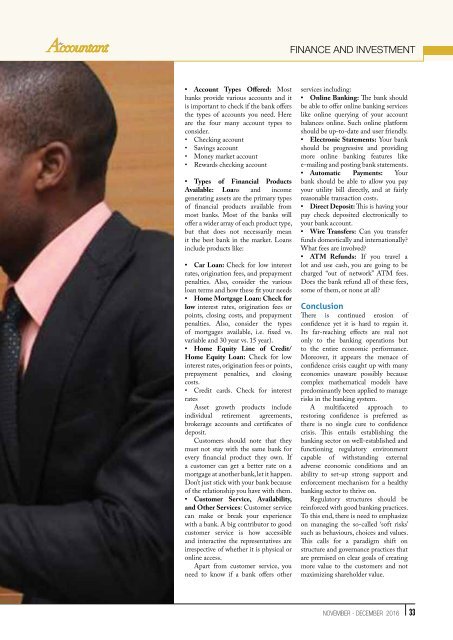The Accountant Nov-Dec 2016
Create successful ePaper yourself
Turn your PDF publications into a flip-book with our unique Google optimized e-Paper software.
Finance and Investment<br />
• Account Types Offered: Most<br />
banks provide various accounts and it<br />
is important to check if the bank offers<br />
the types of accounts you need. Here<br />
are the four many account types to<br />
consider.<br />
• Checking account<br />
• Savings account<br />
• Money market account<br />
• Rewards checking account<br />
• Types of Financial Products<br />
Available: Loans and income<br />
generating assets are the primary types<br />
of financial products available from<br />
most banks. Most of the banks will<br />
offer a wider array of each product type,<br />
but that does not necessarily mean<br />
it the best bank in the market. Loans<br />
include products like:<br />
• Car Loan: Check for low interest<br />
rates, origination fees, and prepayment<br />
penalties. Also, consider the various<br />
loan terms and how these fit your needs<br />
• Home Mortgage Loan: Check for<br />
low interest rates, origination fees or<br />
points, closing costs, and prepayment<br />
penalties. Also, consider the types<br />
of mortgages available, i.e. fixed vs.<br />
variable and 30 year vs. 15 year).<br />
• Home Equity Line of Credit/<br />
Home Equity Loan: Check for low<br />
interest rates, origination fees or points,<br />
prepayment penalties, and closing<br />
costs.<br />
• Credit cards. Check for interest<br />
rates<br />
Asset growth products include<br />
individual retirement agreements,<br />
brokerage accounts and certificates of<br />
deposit.<br />
Customers should note that they<br />
must not stay with the same bank for<br />
every financial product they own. If<br />
a customer can get a better rate on a<br />
mortgage at another bank, let it happen.<br />
Don’t just stick with your bank because<br />
of the relationship you have with them.<br />
• Customer Service, Availability,<br />
and Other Services: Customer service<br />
can make or break your experience<br />
with a bank. A big contributor to good<br />
customer service is how accessible<br />
and interactive the representatives are<br />
irrespective of whether it is physical or<br />
online access.<br />
Apart from customer service, you<br />
need to know if a bank offers other<br />
services including:<br />
• Online Banking: <strong>The</strong> bank should<br />
be able to offer online banking services<br />
like online querying of your account<br />
balances online. Such online platform<br />
should be up-to-date and user friendly.<br />
• Electronic Statements: Your bank<br />
should be progressive and providing<br />
more online banking features like<br />
e-mailing and posting bank statements.<br />
• Automatic Payments: Your<br />
bank should be able to allow you pay<br />
your utility bill directly, and at fairly<br />
reasonable transaction costs.<br />
• Direct Deposit: This is having your<br />
pay check deposited electronically to<br />
your bank account.<br />
• Wire Transfers: Can you transfer<br />
funds domestically and internationally?<br />
What fees are involved?<br />
• ATM Refunds: If you travel a<br />
lot and use cash, you are going to be<br />
charged “out of network” ATM fees.<br />
Does the bank refund all of these fees,<br />
some of them, or none at all?<br />
Conclusion<br />
<strong>The</strong>re is continued erosion of<br />
confidence yet it is hard to regain it.<br />
Its far-reaching effects are real not<br />
only to the banking operations but<br />
to the entire economic performance.<br />
Moreover, it appears the menace of<br />
confidence crisis caught up with many<br />
economies unaware possibly because<br />
complex mathematical models have<br />
predominantly been applied to manage<br />
risks in the banking system.<br />
A multifaceted approach to<br />
restoring confidence is preferred as<br />
there is no single cure to confidence<br />
crisis. This entails establishing the<br />
banking sector on well-established and<br />
functioning regulatory environment<br />
capable of withstanding external<br />
adverse economic conditions and an<br />
ability to set-up strong support and<br />
enforcement mechanism for a healthy<br />
banking sector to thrive on.<br />
Regulatory structures should be<br />
reinforced with good banking practices.<br />
To this end, there is need to emphasize<br />
on managing the so-called ‘soft risks’<br />
such as behaviours, choices and values.<br />
This calls for a paradigm shift on<br />
structure and governance practices that<br />
are premised on clear goals of creating<br />
more value to the customers and not<br />
maximizing shareholder value.<br />
NOVEMBER - DECEMBER <strong>2016</strong> 33


















